Kent Shaw's Blog, page 12
June 30, 2014
It’s like it’s a city. It’s like it’s...
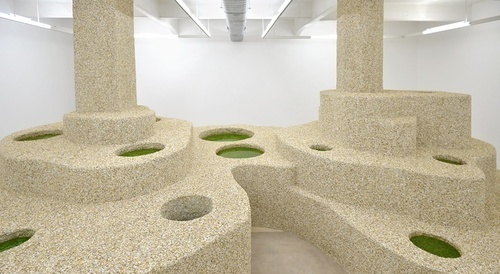
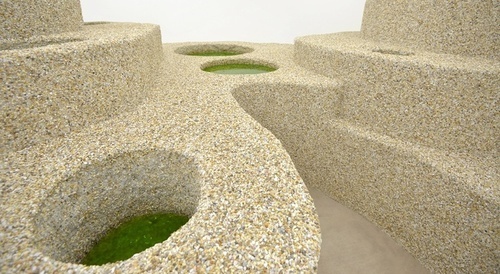
It’s like it’s a city. It’s like it’s softened Brutalism. It’s like a very uncomfortable place to sleep.
Rachel Champion at Hales Gallery (London) through July 26th.
June 20, 2014
I thought it would be interesting to upload a recording of me...
I thought it would be interesting to upload a recording of me reading “What It’s Like,” since I spent so much time talking about in the review I wrote. Maybe you can even hear in my reading that regular rhythm, that structure that I feel underlies most of the poems here. Maybe “Monsieur,” the book’s longer poem, is the single poem that evades that structure.
However, it’s also that structure that allows the reader immediate access to Stone’s more imaginative images.
craigslistmirrors
Sky! Sky and more sky! It often feels as though the person taking the pictures of these mirrors is genuinely surprised that there is a whole other part of this picture. And then they start making adjustments to allow for it.
It makes me think of these Louise Bourgeois pieces. You can see a write up of it here.
I search craigslist for photos of mirrors for sale and post them here. craigslist_mirrors on…
April 18, 2014
What actually happened to James Franco.
What actually happened to James Franco.
April 16, 2014
Urs Fischer Has it in the Bank: New Gagosian Gallery Pop-Up
I really like what this describes about Urs Fischer’s push at ephemerality. And maybe it seems unique to the art world (through use of a degradable material? maybe through site-specific installations?). But what would ephemerality feel like in the poetry world? Is it the internet? Where social media gives us this parade of twitter darlings, whose whole point seems to be overflowing text as testament to their talent, or illimitable energy, or as persistent / constant relevance to a limitless “conversation.”
I guess you could say that it feels like poetry has always been ephemeral. Just because it’s hard to see where poetry fits into the contemporary conversation. Poets talk about poetry. They talk about poems they like. And they talk about who-poetry, like who is hot, who is worth snarking about, who is who. There is culture to poetry. But a sustained conversation where poetry fits into some aesthetic matrix of other-than-poetry-mixed-with-poetry feels almost impossible to find. It exists, of course. But what I would like to see introduced is the real crisis of ephemerality. Oblivion is the constant threat to a poem. “Please don’t let my poems disappear!”
For Fischer, oblivion and that tip into oblivion is just a big joke. “Will my art disappear? Ha ha! I meant it to disappear!” But then it won’t disappear. And that makes the joke more complicated. Fischer is safe to taunt oblivion, because there is a larger art market.
It strikes me that Katie Peterson’s review of Lost and and The Gorgeous Nothings presumes the life the writer / photograph / curator brings to pieces that could have been lost. Her review treats us to the delight poets find in ephemera, but this still leaves out the issue of ephemerality. But how does a published poem taunt oblivion? How does a poet strike his or her Ha ha! stance? And, to be clear, the issue is not subject or style, it is material existence. Is the answer conceptualism? It’s the only answer I can think of right now.
April 11, 2014
Art shedding.
brooklynmuseum:
#BKArtistBall artist Nick van...
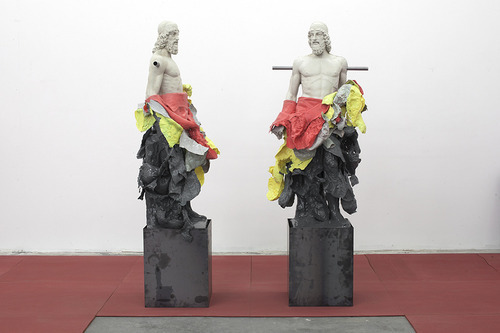
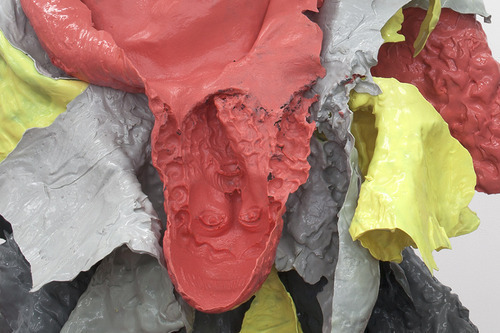
Art shedding.
#BKArtistBall artist Nick van Woert is informed by his background in architecture and his fascination with antiquity - he cites Vitruvius, the early Roman architect who was inspired by nature, as a significant influence.
March 24, 2014
Sixth Finch - Winter 2014 - Mathias Svalina - WASTOID
Mathias Svalina gives me great anxiety. At all times anxiety. I read his Destruction Myth so long after any sensible reader would have read it. And I was fascinated by it and anxietied by it. Yes, the title says DESTRUCTION yet what I read inside are creation stories. What am I supposed to do when my mind seizes, Mr. Svalina? I was looking for the very, very complex optimism and certainty that resides in a creation myth. I want that to be toyed with. And tickled. Mr. Svalina, you dirty dog, you exploited the creation myth and laid it out for destruction. And maybe I’m too precious about creation myths.
But this is why I anxiety when I read a Mathias Svalina poem. I am afraid he will exploit what is precious to me. Do I like these poems in Sixth Finch, then, because I have a relationship with “Wastoid”s? I don’t think that’s it. It’s more about the stretched idea. The convoluted logic getting pulled taut and even tauter after that, so an idea, maybe of manhood, or loving a man who you want to know is so full of manhood it is an unmistakable quality that compels the speaker. With a final idea underlying it all that feeling compelled is like love.
And I know reading these poems that all the world and stylings of Destruction Myth is right here in these Wastoid poems. And maybe what Svalina is actually toying with is love rather than creation. Alas. To me, I like seeing contradiction and compulsion toyed with.
Sixth Finch - Winter 2014 - Mathias Svalina - WASTOID
March 19, 2014
If I could live inside an envelope, this is what I would like it...
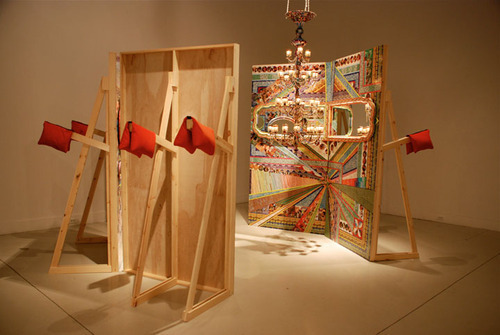
this is it 2010 discarded lottery tickets, romance novel covers, wood and found objects 108" x 156" x 168"

detail of one of the mirrors in this is it
If I could live inside an envelope, this is what I would like it to look like. Very spectacular on the inside. Very disposable on the outside.
"Who needs a Kent Shaw, anyway?" says the world.
"Look, a Kent Shaw!" I could say from inside.
“Our sculpture and installations embody the essence of opulence while being constructed of materials that typically end up in the trash”, - Adam Eckstrom and Lauren Was, the duo behind #BKArtistsBall participants Ghost of a Dream.
March 18, 2014
Kate Partridge: two poems and a lyric essay, from BETTER issue four
I like paying attention to Kate Partridge. Her poems and non-fiction in Issue #4 make me believe there is a treatise somewhere titled, “The Poetics of Inquiry.” It is a document related in a second cousin kind of way to Lyn Hejinian’s Language of Inquiry, but Partridge’s poems would represent more a transparent view into the poet’s mind where there is constant thinking “Why this?” and “Why this?” Is there a personification of “Why this?” that is actually Kate Partridge walking down the sidewalk? Perhaps. Whatever the case, Kate Partridge, please give me more of the Why this?’s! Because I like listening. I like paying attention to Kate Partridge. Her attention is just right. In the creative non-fiction piece, “Bell,” she indulges the life of Alexander Graham Bell, because thinking about him helps her sort out the definition of the decibel, which is the real point of the essay, and if you’re paying attention to Kate Partridge she’ll give you just enough time with Mr. Bell before she goes back to the main topic. What skill! In the poem, “I Like the Muscles on That One,” she gives in to the fine musculature of the ball players and of her friend’s musculature, too, just enough poetic attention so she can bring the heat and curiosity into the moment. It’s like attention is a tunable instrument, and Partridge has adjusted it just right, because there are so many other things to be inquiring about in this “Muscles” poem. Don’t you want to think about Walt Whitman as an athlete? A female athlete?
And so I suppose it’s her inquiry and her fresh invention that make the poems and lyric non-fiction such a treasure for this issue. Of course, inquiry and invention are natural seat-mates in a poem. They usually are. But here the two have developed into that fine, mature relationship based on mutual needs. That kind of relationship where you can tell they just like each other and their conversation is that pile-up kind where each side is almost finishing the other’s sentences, and still they want to give each the time to finish. These are Kate Partridge’s pieces to me. Eager and interested for that work going on between inquiry and invention, but never impatient to keep one from having its say.
Sixth Finch - Winter 2014 - Sasha Fletcher - FAILED LOVE AFFAIR IN A PORT-SIDE TOWN
Dear Sasha Fletcher, will you please let me appear in one of your next poems. Only a cameo me. And only a me that doesn’t do anything to ruin that great big round plot that nuclear explodes all over this poem, like the way Donald Rumsfeld would have liked it if nuclear bombs expressed his personal hate for Iraq in the 2000s, and he still ruined everyone in the United States for ten years. That is how big I see your plot in this poem.
FYI, I have not failed nor will fail in my love for this love affair you have here. Submarines on land. Regional maps that are always accessible. I only want to appear in this poem, because I want closer to your poem. I want to be there with the poem while it’s in full poeming mode.
Sixth Finch - Winter 2014 - Sasha Fletcher - FAILED LOVE AFFAIR IN A PORT-SIDE TOWN



